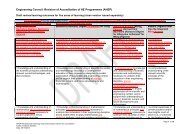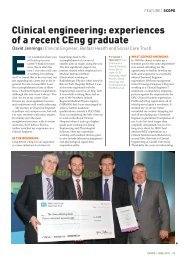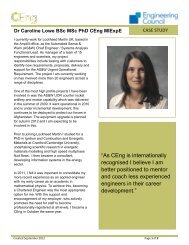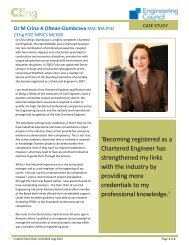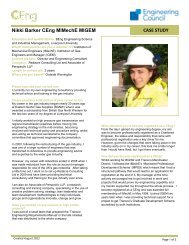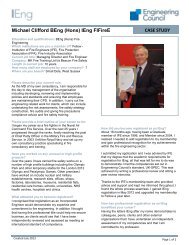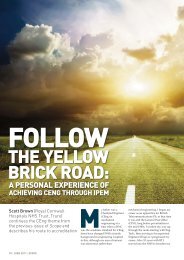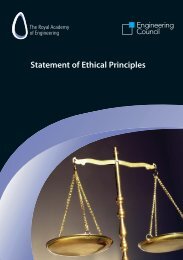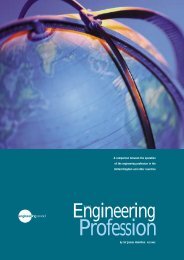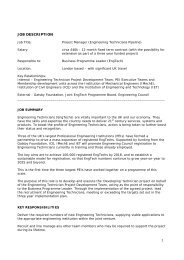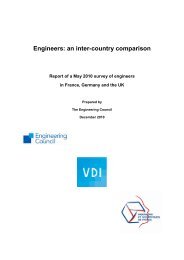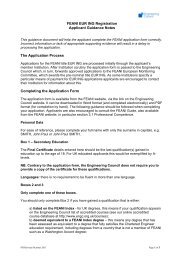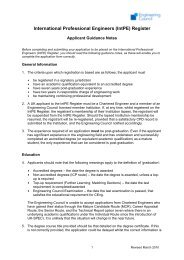An Engine for Change - A Chronicle of the Engineering Council
An Engine for Change - A Chronicle of the Engineering Council
An Engine for Change - A Chronicle of the Engineering Council
You also want an ePaper? Increase the reach of your titles
YUMPU automatically turns print PDFs into web optimized ePapers that Google loves.
50A CHRONICLE OF THE ENGINEERING COUNCILat Part 2 level. <strong>An</strong> Examination Review Working Party was set up by <strong>the</strong> Board <strong>for</strong><strong>Engine</strong>ers’ Registration to reconsider <strong>the</strong> guidance and rules <strong>for</strong> candidates and to review <strong>the</strong>structure and syllabi <strong>of</strong> <strong>the</strong> Examination.Continuing Education and Training‘A Call to Action – Continuing Education and Training <strong>for</strong> <strong>Engine</strong>ers and Technicians’,prepared by Bernard Dawkins, <strong>the</strong> EngC’s CET Executive in <strong>the</strong> <strong>Engine</strong>ering Pr<strong>of</strong>essionDirectorate, was published in June 1986. This well-received report looked at clear linksbetween a company’s per<strong>for</strong>mance and its investment in <strong>the</strong> CET <strong>of</strong> its employees. Two<strong>An</strong>nexes were also published: an ‘Industrial Consultants’ Survey’ and a ‘Summary <strong>of</strong>Responses to <strong>the</strong> Discussion Document’. The report was followed up in 1987 with a wellattendedconference in Liverpool dealing with Britain’s urgent need to improve <strong>the</strong> CET <strong>for</strong>engineers and technicians.The EngC fur<strong>the</strong>r developed this <strong>the</strong>me in a consultative document ‘Continuing Educationand Training: A national system <strong>for</strong> engineering’, calling <strong>for</strong> Career Action Plans in whichengineers should consider and state <strong>the</strong>ir intentions <strong>for</strong> CET <strong>for</strong> a year or more ahead. Thisproved extremely popular in early 1988 with requests pouring into <strong>the</strong> EngC at <strong>the</strong> rate <strong>of</strong> 500a week from industrial executives who had read about it in <strong>the</strong> press. Consequently <strong>the</strong> EngChad to reprint <strong>the</strong> discussion document within six weeks <strong>of</strong> its launch. A working party wasestablished and a Workshop held at <strong>the</strong> University <strong>of</strong> York followed by pilot schemes to test<strong>the</strong> ideas on a national scale later in 1988, as we shall describe in Chapter 4.The document ‘Management and Business Skills <strong>for</strong> <strong>Engine</strong>ers: a Statement – ContinuingEducation and Training’ was published in March 1988, contending that engineers couldbecome very successful managers. The statement reviewed <strong>the</strong> background and suggestedhow individual engineers interested in management and business skills should learn aboutbusiness.Interfacing InternationallyFEANI and European <strong>Engine</strong>er (EurIng)International agreement on <strong>the</strong> Eur Ing standard, mentioned in Chapter 2, was reached in1986, with important contributions coming from <strong>the</strong> British National Committee <strong>for</strong>International <strong>Engine</strong>ering Affairs (BNCIEA), involving a fundamental revision <strong>of</strong> <strong>the</strong> FEANIRegister. This now laid down minimum standards <strong>for</strong> registration and a system <strong>for</strong>monitoring and up-dating standards. Following an agreement between BNCIEA and FEANIwhich finally gave international recognition to Chartered <strong>Engine</strong>ers (see Chapter 2) <strong>the</strong> term“European <strong>Engine</strong>er” and associated designatory letters “Eur Ing” were launched in Paris inOctober 1987 during a ceremony at <strong>the</strong> Luxembourg Palace. The five chairmen <strong>of</strong> <strong>the</strong>Executive Group Committees <strong>of</strong> <strong>the</strong> Board <strong>for</strong> <strong>Engine</strong>ers’ Registration, and five o<strong>the</strong>rBritons, were among <strong>the</strong> first 60 pr<strong>of</strong>essional engineers to be awarded <strong>the</strong> title European<strong>Engine</strong>er.For Technician <strong>Engine</strong>ers a seminar, organised by <strong>the</strong> EngC and chaired by Sir MontyFinniston, was held in 1987 at <strong>the</strong> Royal Society <strong>of</strong> Arts on <strong>the</strong>ir role, education and trainingin countries o<strong>the</strong>r than Britain, particularly France, West Germany, USA and Japan. Thespeakers were four Churchill Travelling Fellows.© <strong>Engine</strong>ering <strong>Council</strong> UK 2004



